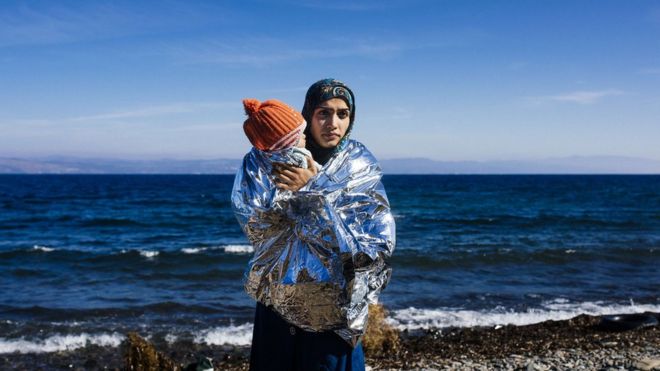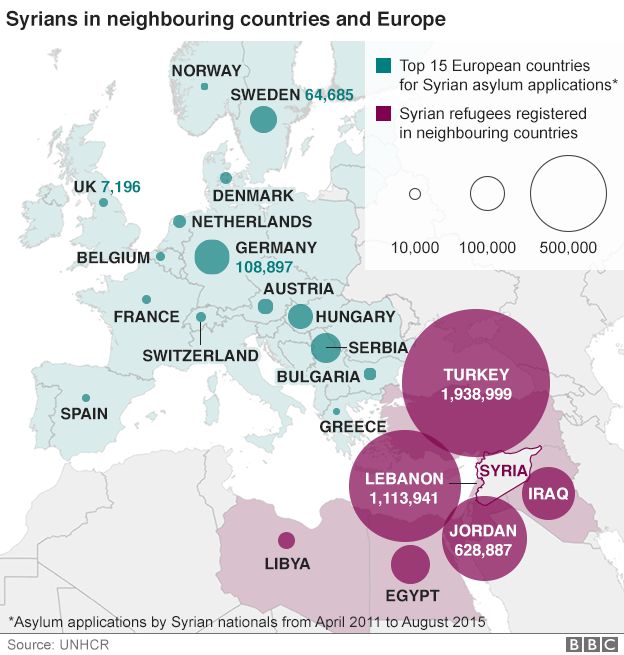
Thousands have made the perilous journey from Turkey to the Greek islands
Turkish officials have stressed that a plan agreed by EU officials for joint action with Turkey on the migrant crisis has not been finalised.
The leaders agreed to speed up visa liberalisation talks for Turks if Turkey stems the influx.
They also promised to “re-energise” talks on Turkey joining the EU and to consider more aid.
However, Turkey’s Feridun Sinirlioglu foreign minister said the agreement was still a draft.
He called the financial measures proposed by the EU “unacceptable”, according to the AFP news agency.
At Thursday’s summit in Brussels, European leaders agreed to:
- accelerate visa liberalisation for Turks wanting to visit the EU’s borderless Schengen area – if Turkey complies with certain criteria
- “re-energise” talks over Turkey joining the EU
Nearly 600,000 migrants have reached the EU by sea so far this year, many of them travelling from Turkey.
Read more
Can deeds match words?: The challenges ahead for the EU and Turkey
The pull of Europe: Five migrant stories
Merkel under pressure: Chancellor’s migrant policy faces criticism at home
Focus on Turkey: Why the EU views Syria’s northern neighbour as key
Crisis in graphics: Migration numbers explained
Also on Friday, Hungary announced it is closing its border with Croatia at midnight local time (2200 GMT).
Hungary has been a major destination for migrants during the crisis, who often aim to continue on to Austria and Germany. Last month it sealed its border with Serbia.
Meanwhile a migrant thought to be Afghan was shot dead by a Bulgarian border guard after entering the country from Turkey late on Thursday.
Bulgarian Prime Minister Boyko Borisov left the Brussels talks on hearing the news.
At the talks German Chancellor Angela Merkel said EU states were considering a Turkish request for €3bn (£2.2bn, $3.4bn) in aid.
Jean-Claude Juncker, the president of the European Commission, said talks over the aid would continue with Turkish officials over the coming days.
Mrs Merkel will travel to Turkey at the weekend.
“There is still a huge amount to do,” Mrs Merkel said. “But you cannot say that we’ve achieved nothing.”
EU sources had said several countries were cautious about coming to an agreement with Turkey too quickly.
Among them were Greece, Cyprus and France.
Earlier on Thursday, Mrs Merkel said all EU countries must be prepared to send security staff to the bloc’s external borders.
She said it would be unfair to ask EU countries seeing the majority of initial migrant entries to secure borders as well.
“It’s quite obvious that only a few countries today take the majority of refugees and if these countries now are asked to secure the external borders on top of that, I don’t think it would be what we could call a fair distribution of effort,” Mrs Merkel said.
She described the current situation as “very disorderly”.
Turkey is hosting some two million migrants, most of them fleeing the war in neighbouring Syria.
Turkey has also called for the establishment of an international “safe zone” for refugees inside northern Syria – but Mr Tusk said Russia’s involvement in Syria made the idea more difficult.
Also in Brussels, UK Prime Minister David Cameron said he would present four main demands for change in the EU in November. It comes ahead of a promised referendum on the UK’s membership of the EU in 2017.
Mr Tusk welcomed Mr Cameron’s announcement, adding that the “real negotiations” could start after early November.

BBC
 Q FM Africa's Modern Radio
Q FM Africa's Modern Radio